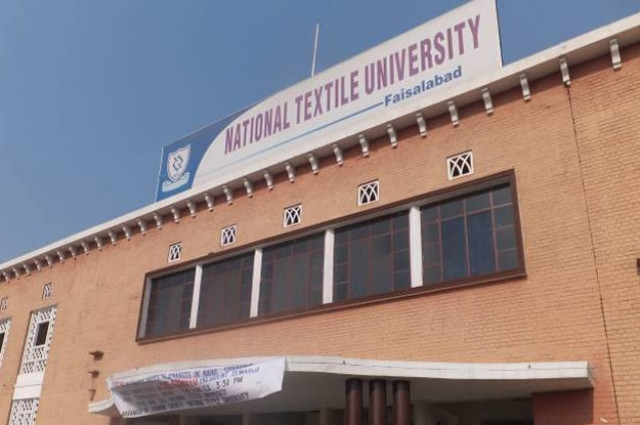Strict dress code enforced for students and faculty at NTU
A notification issued last month lists various clothes and accessories banned on the campus

National Textile University, Faisalabad. PHOTO: FILE
The notification issued by Professor Muhammad Ashfaq, the registrar, on April 27, said: “In order to promote a positive image of the NTU and to maintain good moral, religious and cultural values among the faculty, staff and students, a dress code has been issued and faculty members, staff and security personnel have been asked to ensure its implementation”.
The notification also requests the faculty, staff and students “not to wear tight or transparent dresses, T-shirts or any clothes carrying emblems, letters, art, or slogans and pictures printed on them”. Ripped clothes, sweat shirts and jogging tracks have also been banned on campus.
The faculty and staff have been advised not to wear shabby, untidy or immodest clothes on university premises. They have also been told not to wear open-toed shoes. The notification specifically mentions that the faculty and staff must not wear “unprofessional attire at formal events and to interviews”.
Among other items that students and faculty members have been told not to wear are “stylish” sunglasses and designer peak-caps. “Male faculty members and students may not wear sleeveless shirts, shorts or any kind of shawl,” the notification says.

Dr Ashfaq, who issued the notification, told The Express Tribune that the NTU’s administration had issued a clarification through an office order on May 5, saying that the NTU management did not believe in imposing unreasonable restrictions on faculty, staff and students. “Everyone is free to wear whatever they want to, as long as it is in accordance with the dress code, is suitable, decent and in accordance with the values enshrined in the divine code and in the Constitution of the Islamic Republic of Pakistan.”
The second notification came in response to a barrage of protests from the students and teachers of the NTU.
Dr Ashfaq said, “Some elements are trying to create an issue over the dress code. However, we believe that we must set the right standards for our students and faculty in accordance with our culture and traditions.” He stressed that the university had not imposed any “unnecessary” restrictions.
Some students favour the dress code. Ahmad Faraz Ali, a student of BSc, said imposing a dress code was a step in the right direction. “We need to protect our campus from vulgarity which has been rampant … Girls and boys were allowed to wear tights, ripped jeans and sleeve-less shirts.”
He said the dress code had been introduced in order to create an environment conducive to academics, “not vulgar traditions”. Ali lauded the new dress code and said it was long coming. “It will help improve our university’s image.”
Muhammad Amin, an Msc student, however, did not think that the dress code would help improve NTU’s image. “It makes it seem as if the NTU’s student body was involved in immoral activities and the university administration had to step in and rein us…that has never been the case. Enforcing a dress code can only create a repressive environment.”
Muhammad Jameel, a BBA, agrees. “I don’t think there should be a dress code. We all wear whatever our parents can afford to buy us. If I want to wear a sleeveless shirt because of the weather, how am I violating our cultural tradition?”
Published in The Express Tribune, May 10th, 2016.



















COMMENTS
Comments are moderated and generally will be posted if they are on-topic and not abusive.
For more information, please see our Comments FAQ